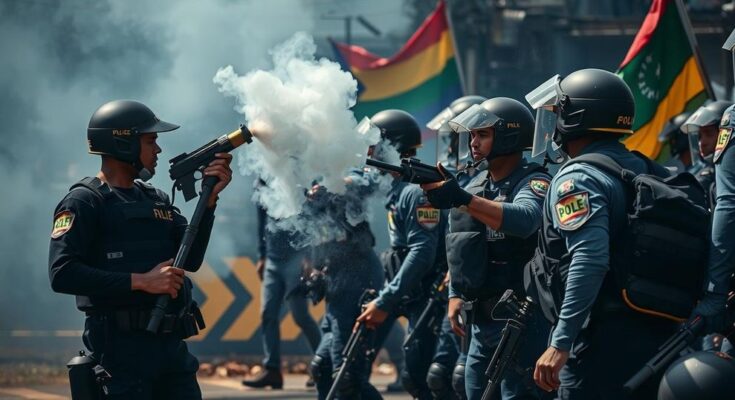Police in Mozambique employed tear gas against thousands of protesters in Maputo opposing the election results from October 9. The opposition alleges electoral fraud following the FRELIMO party’s significant victory. Human Rights Watch has recorded multiple fatalities amid rising tensions, with calls for international human rights adherence. The unrest has prompted security forces to patrol streets, and operations at border crossings have been affected.
Protests erupted in Maputo, Mozambique, as police deployed tear gas to disperse crowds demonstrating against the results of the October 9 elections. Thousands gathered in the capital, leading to heightened tensions and accusations of electoral fraud by the opposition towards the ruling FRELIMO party. The party’s candidate, Daniel Chapo, reportedly won 70.67% of the votes, while main rival Venancio Mondlane received 20.32%. Human Rights Watch has reported at least 18 fatalities connected to the unrest, raising serious concerns about public safety and police conduct. Security forces have been observed actively patrolling the streets to quell gatherings, following a violent weekend that claimed the life of a police officer during protests. Defense Minister Cristavao Chume expressed that military intervention might be necessary to safeguard state interests. In response to rising violence, the United Nations High Commissioner for Human Rights, Volker Türk, urged police to avoid excessive use of force and adhere to international human rights standards. Opposition leader Venancio Mondlane stated that Mozambique is at a “crucial moment,” expressing belief in a potential political transition spurred by dissatisfaction with the election results. He highlighted the atmosphere of unrest as indicative of historical change, while his supporters continue to challenge the legitimacy of the election outcomes. Amid these tensions, operations at ports and terminals have been suspended, and there have been border restrictions between Mozambique and South Africa, further complicating the crisis. As protests continue to unfold, the world watches closely for developments in Mozambique’s tumultuous political landscape and the responses of law enforcement to public dissent.
The current unrest in Mozambique follows controversial election results announced on October 9, 2024, which have triggered public demonstrations amid allegations of fraud by the opposition. The ruling FRELIMO party’s significant victory has been met with widespread skepticism, particularly from the Podemos and RENAMO parties. The resulting protests have led to violent confrontations, raising concerns about human rights violations and public safety as the situation continues to escalate. Additionally, the unrest has affected regional logistics, notably with suspensions of operations at significant border points and terminals.
The ongoing unrest in Mozambique highlights the deep divisions within the country’s political landscape following disputed election results. The use of force by police, coupled with rising mortality rates and calls for military intervention, suggests a critical turning point for governance in Mozambique. Opposition leaders assert that the demonstrated public dissatisfaction may signal a demand for political transformation, while international bodies advocate for adherence to human rights during this period of uncertainty.
Original Source: www.dw.com




